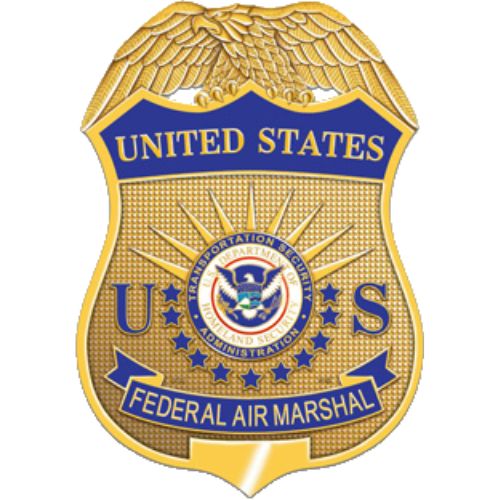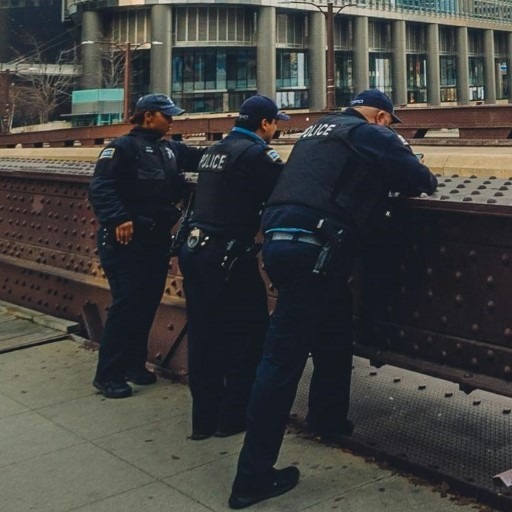Start Your Career as a Federal Air Marshal
What is a Federal Air Marshal?

The primary duties of a Federal Air Marshals is to secure commercial screened flights in the air for emergencies of hijackings, terrorism, and other threats. They always work undercover, able to deal with any emergency situation.
FAMs under the Transportation Security Administration (TSA), which is a part of the Department of Homeland Security (DHS). They undergo training in firearms, hand-to-hand combat, surveillance, and threat assessment to ensure the flight safety of passengers, crew, and aircraft. Federal air marshals are responsible for protecting aircraft and passengers and building public confidence in airline security.
What are the duties of a Federal Air Marshal?
The duties of a Federal Air Marshal (FAM) include:
Flight Security: FAMs are responsible for safeguarding air travel and any aggression, terrorist activities, and unwarranted and detaining aircraft to execute their criminal plans.
One of the most intriguing aspects of an FAM’s duties is its involvement in undercover operations. FAMs skillfully blend in with the passengers, ready to thwart any security breaches or threatening behavior.
Law Enforcement: FAMs are responsible for ensuring that aviation-related federal laws are enforced, offenders are arrested, and adequate measures are taken to mitigate any security risks.
Crisis Response: In the event of an emergency, such as a hijack or imminent threat from a terrorist group, the flight attendant in this role is key. They are responsible for taking swift and decisive actions to ensure the safety of passengers, crew, and the aircraft.
Intelligence Gathering: FAM’s focus on surveillance and intelligence gathering related to potential threats against aviation security brings them close cooperation with other law enforcement agencies and intelligence organizations to obtain information and disrupt attacks.
Firearms Proficiency: FAM members have a proficiency level in firearms and tactical skills to professionally confront security threats when on aircraft.
Surveillance: FAMs are also responsible for conducting surveillance and monitoring in the air and terminals. Their goal is to identify potential threats and detect any security vulnerabilities.
Public Outreach: To maintain a safe atmosphere within the air travel sector, FAMs can conduct public outreach and education programs to make people vigilant about aviation security and compliant with passengers and crew members.
Requirements to be a Federal Air Marshal.

The requirements to become a Federal Air Marshal typically include:
Education: Candidates must graduate from an accredited institution with a Bachelor’s degree certificate. Different branches of the jobs industry are primarily criminal justice, homeland security, law enforcement, and other related areas. The area, of course, may be different, but the degree is the same.
Age: Candidates may be between the ages of 21 and 36, including at the time of the appointment. This selection also guarantees that candidates who can withstand the physical workload and demands of a Federal Air Marshal role onboard will be protected.
Experience: While military or police experience is not always a prerequisite, it is often a beneficial factor. We prioritize candidates with past experience from federal law enforcement agencies, special operations units of the military, and state and local police departments. Additionally, skills such as firearms competence, tactical operations, surveillance, and threat analysis are highly valued and can make an applicant stand out. We encourage all potential candidates to develop these skills to enhance their candidacy.
What is the testing process to get a job as a Federal Air Marshal?
The Federal Air Marshal standard to select candidates for their role involves several stages of testing. Here’s an overview of the typical testing process:
Application Submission: First, the individuals complete the work-related process by applying for the position via the FAMS service under the Federal Air Marshal Service or through the specific agency controlling the hiring process.
Assessment Questionnaire: Candidates may have to enroll in an assessment test as part of the first season screening process. This questionnaire helps determine whether candidates meet certain basic qualifications and eligibility criteria for the position.
Written Examination: Applicants may have to take a written test if the exam is designed to assess whether the individual has knowledge of many aspects relevant to the job responsibilities of Federal Air Marshals. This test could deal with scenarios including law enforcement operations, weapon proficiency, tactical operations, and aviation security discipline.
Physical Fitness Test: Regarding the physical requisite, it is mandatory that the applicants be subjected to a physical fitness test to ensure their level of physical preparedness for the demands of the job. The test is often done via different exercises that check strength, endurance, agility, and cardiovascular fitness.
Psychological Evaluation: Psychometric testing might be included as part of candidates’ checkup to ensure that they have strong emotional and mental health to cover this high-stress role. This assessment helps the tenants determine whether the candidates have the psychological resilience and stability to face the stress of the job and its inconveniences.
Background Investigation: A complete background inspection is done to authenticate candidates’ work experience and education history as well as individual and personal data, to seem trust and could fit for security clearance.
Medical Examination: The candidates will have to undergo all the medical examinations to determine their total health and physical condition before being deployed for the particular job. This sometimes involves taking general medical conditions like vision, hearing, etc., and/or measuring blood pressure.
Interview: Appropriate participants via expert candidates at one or more interviews as part of the selection process. These assessments permit employers to evaluate candidates’ communication skills, decision-making ability, and appropriateness for their desired roles.
Training Program: Candidates who pass the testing procedure and are chosen for the position experience training provided through the Federal Air Marshal Service or the same relevant agency.
The process for the Federal Air Marshals job is designed to find the right people who meet the requirements of the job, which is to assure the security of passengers during flights.
What types of agencies have Federal Air Marshal?

While the Federal Air Marshals (FAMs) mainly belong to the Federal Air Marshal Service (FAMS) Branch of the TSA, which is situated under the DHS, the TSA is responsible for transportation security in the country and deals with aviation and other related matters, as well. On the one hand, the FBI Air Marshals may collaborate with different emergency agencies of various countries, local countries, or states to ensure that aviation security and counterterrorism exercises are executed well. These agencies include:
Transportation Security Administration (TSA): FAMS belongs to the TSA’s family of agencies that handles the assignment of Federal Air Marshals to domestic and international flights to protect travelers, flight crewmembers, and aircraft from threats that can put the whole flight at risk.
Department of Homeland Security (DHS): FAMS is under the jurisdiction of DHS, which encompasses the security of America from diverse threats, namely terrorism, natural disasters, and cybersecurity risks.
Federal Aviation Administration (FAA): The FAA, while not directly responsible for the deployment of Federal Air Marshals, plays a crucial supportive role. It collaborates with the FAMS and other agencies to develop and implement regulations that enhance safety and security in aviation, ensuring a comprehensive approach to aviation security.
Department of Justice (DOJ): According to the DHS, Federal Air Marshals may collaborate with DOJ offices that house different security agencies, such as the FBI, DEA, and ATF, on problems concerning counterterrorism and law enforcement.
United States Customs and Border Protection (CBP): FAMS can partner with the CBP, especially on international flights, to develop threat-interdiction measures that mitigate them from entering the country.
State and Local Law Enforcement: A hijacked aircraft could potentially impact many people, so other agencies, even the Federal Air Marshals, need to work together with state and local law enforcement agencies to provide security and law enforcement in transport hubs. In this effort, there could be police departments and sheriff’s offices.
International Partners: The importance of international partnerships in aviation security cannot be overstated. International aviation agencies, in collaboration with governments, law enforcement agencies, and aviation societies, exchange intelligence, conduct joint operations, and enhance the global antiterrorism regime. This underscores the significance of your role in the broader global security landscape.
What will disqualify someone from becoming a Federal Air Marshal?
Factors that may disqualify someone from becoming a Federal Air Marshal include:
- Criminal History: Felony convictions, domestic violence convictions, and crimes of honesty.
- Drug Use: Drug abuse, this time either present-day or recently, was experienced.
- Poor Credit History: Issues with your credit that show poor judgement.
- Employment Disqualifiers: Issues related to past employment.
- Security Clearance Issues: The inability to obtain a security clearance.
- False Information: Having provided false information during the hiring or background process.
- Minimum Requirements: Failing to meet the minimum requirements.
- Legal Restrictions: Any legal issues that would prohibit you for being hired or performing the duties of a FAM.
- Mental Health Issues: Any mental health issues that would prohibit you for being hired or performing the duties of a FAM.
- Prior TSA Employment Issues: For example, previous disciplinary acts, termination, etc.
What is the pay for a Federal Air Marshal?

The compensation (pay) for Federal air marshals is also pertinent to some other aspects that play a role in the amount received by the air marshals. For instance, experience, location, and rank, among others, are critical determinants of their pay. New hires now become federal air marshals for about $40,000 to $ 50,000 annually as the veterans get a little bit more of what they deserve, which may be above $100,000.
The payment system for federal air marshals is designed to be lucrative, with potential boosts in the form of overtime pay, night shifts, and hazardous duty. This ensures that the job of a Federal Air Marshal is consistently high-paying, providing a good remuneration.
What is involved in the Federal Air Marshal Training Program?
The Federal Air Marshal Training Program is an extensive and highly demanding recruiter training with all the knowledge and know-how that will see recruits discharge their duties successfully. It typically includes:
Firearms Training: Recruits undergo arduous gun-handling training to get armed with accuracy and unmatched shooting confidence.
Defensive Tactics: Through hand-to-hand combat training and tactical defense lessons, marshals are equipped with the intellectual and physical abilities to deal with conflicts that may become close-quarters and intense.
Threat Assessment: The recruits are taught how to identify potential threats and scrutinize the priceless habit of detecting dubious behavior that can put flying at risk.
Legal and Ethical Training: The Marshals are taught everything about relevant laws, regulations, and moral conditions that govern their role, as well as use-of-force policies and RoE rules.
Emergency Response: Staff is trained to respond to diverse emergency situations, from hijackings to bomb threats to security emergencies.
Surveillance Techniques: Recruits are trained in surveillance techniques, such as covert surveillance, and can discreetly identify dangerous threats.
Aviation Security Procedures: FAMs learn about all the airport security procedures, passenger screening techniques employed, and regulations of the aviation industries to ensure safety and security.
Crisis Management: Through the training, marshals will learn about crisis management and decision-making under pressure, which will help them take responsibility for themselves and others when facing high-stress conditions.
Physical Fitness: The recruits undergo physical fitness training, which is preparation geared toward their peak physical condition. This enables them to carry out their duties, and they thus remain ready for action.
Recurrent Training: The Federal Air Marshals are routinely trained and evaluated to ensure that they are prepared for any given situation. This helps them remain conscious of the emerging risks, policies, and procedures that are observable in the air transport industry.
Broadly, the federal government’s Air Marshal Training Program is meant to prepare officers for counterterrorism work, combat airline security risk factors, and equip them with the necessary tools to deflect threats to passengers, crew, and airplanes.

 Joseph Libowsky,
Joseph Libowsky,